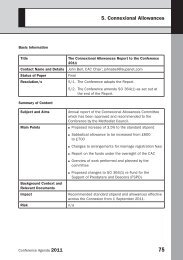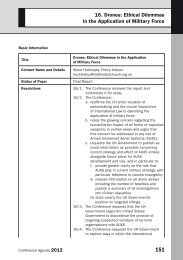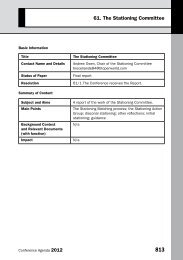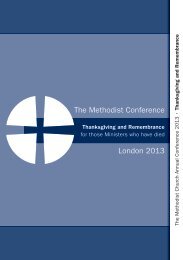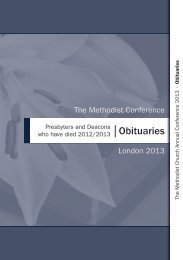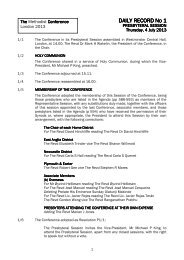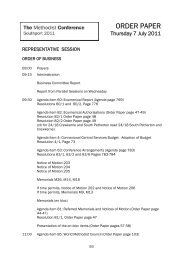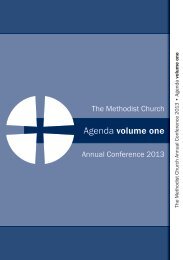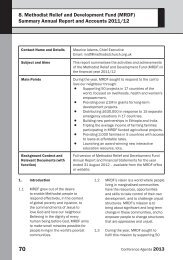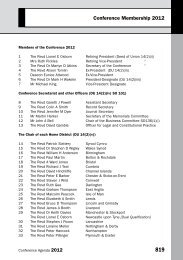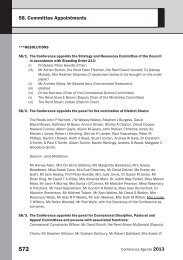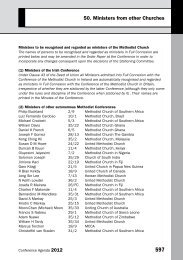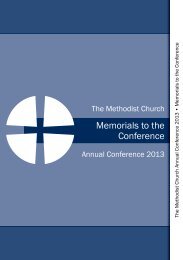Agenda Volume 3 - Methodist Conference
Agenda Volume 3 - Methodist Conference
Agenda Volume 3 - Methodist Conference
You also want an ePaper? Increase the reach of your titles
YUMPU automatically turns print PDFs into web optimized ePapers that Google loves.
57. The Fruitful Field Project<br />
Overview of the Report<br />
1 Part 1 of the report is concerned<br />
with the context for The Fruitful<br />
Field project. Section A (paragraphs<br />
3-5) briefly introduces the report’s<br />
scope and mandate. Section B (6-<br />
24) roots our task of discernment in<br />
reflection upon scripture in the light<br />
of the tradition of the Church and our<br />
present experiences and contexts.<br />
Section C (25-47) outlines the origins<br />
of The Fruitful Field and describes<br />
the processes which the Ministries<br />
Committee has implemented<br />
since the 2011 <strong>Conference</strong>, which<br />
included a consultation period<br />
during the autumn of 2011. Section<br />
D outlines the current provision<br />
which the <strong>Conference</strong> sponsors and<br />
supports in the fields of formation,<br />
learning, training, theological<br />
education, scholarship, research and<br />
development. This section describes<br />
the pathways, opportunities,<br />
programmes and resources which<br />
are currently offered (49-55), the<br />
expert staff and the institutions,<br />
colleges and centres which support<br />
this provision (56-82), and the overall<br />
budget for this area (83-85). Section<br />
E outlines the financial, infrastructural<br />
and educational challenges and<br />
opportunities faced by the Church<br />
in this area (86-111). Section F<br />
outlines the ways forward explored<br />
by the Ministries Committee during<br />
the current connexional year. This<br />
section includes extracts from a<br />
consultation document published in<br />
October 2011 (113) and from the<br />
Committee’s interim response to the<br />
consultation published in February<br />
2012 (114). Those who have already<br />
read the consultation document and<br />
the interim response will be familiar<br />
with much of the content of sections<br />
D-F. The inclusion of these sections<br />
within this report formally places the<br />
information before the <strong>Conference</strong>.<br />
2 Part 2 of the report outlines<br />
the Ministries Committee’s<br />
recommendations. Section G<br />
outlines the primary and overarching<br />
recommendation, namely the<br />
establishment of the Discipleship<br />
and Ministries Learning Network,<br />
whose purposes (117-126) are the<br />
support of discipleship development,<br />
ministry development, and church<br />
and community development across<br />
the Connexion, and the nurturing of<br />
scholarship, research and innovation.<br />
This section also identifies the values<br />
of the Network (127) and some of its<br />
early goals (128). A redevelopment<br />
of pathways for Local Preachers<br />
and Worship Leaders within the<br />
context of the Network is explored<br />
(132-147), as is the opportunity<br />
for the Network to participate<br />
within a developing ecumenical<br />
Higher Education partnership with<br />
the Church of England (148-156).<br />
Section H outlines the recommended<br />
structure of a staff team to support<br />
the Network’s activities. The ways<br />
in which the staff team will work<br />
regionally (163-171) and in centres<br />
(172-177) are explored, as is the<br />
make-up of the Network’s coordinating<br />
team (178-179). Implications for<br />
the Connexional Team which flow<br />
644 <strong>Conference</strong> <strong>Agenda</strong> 2012



